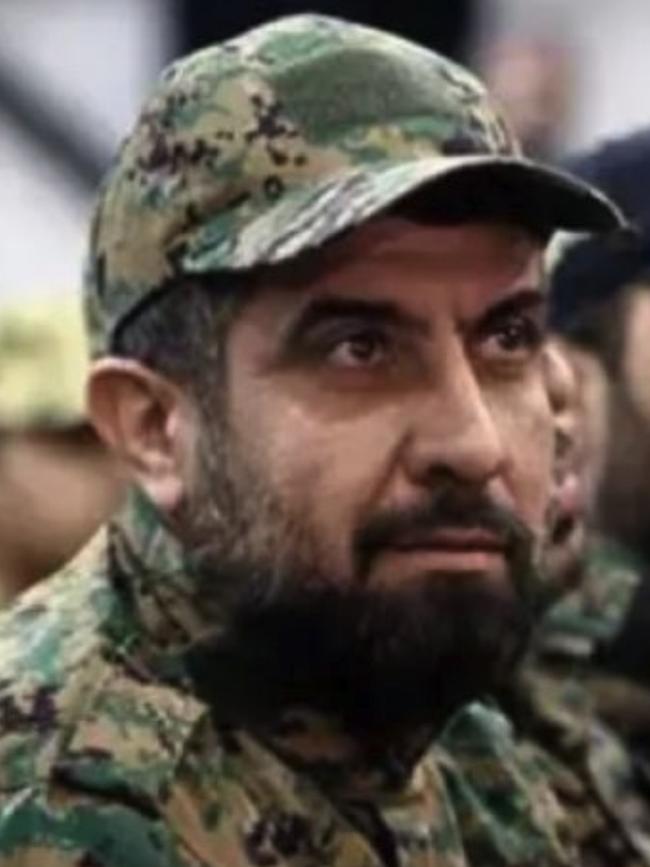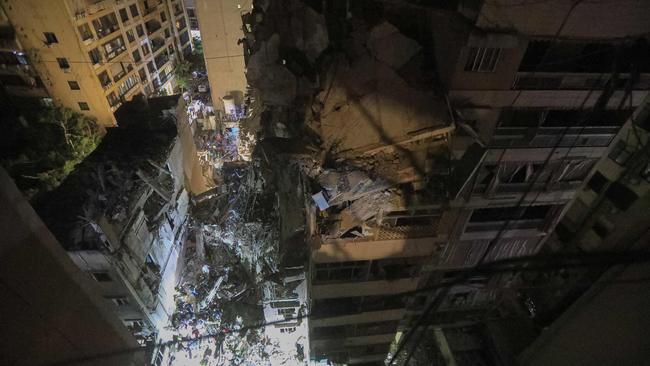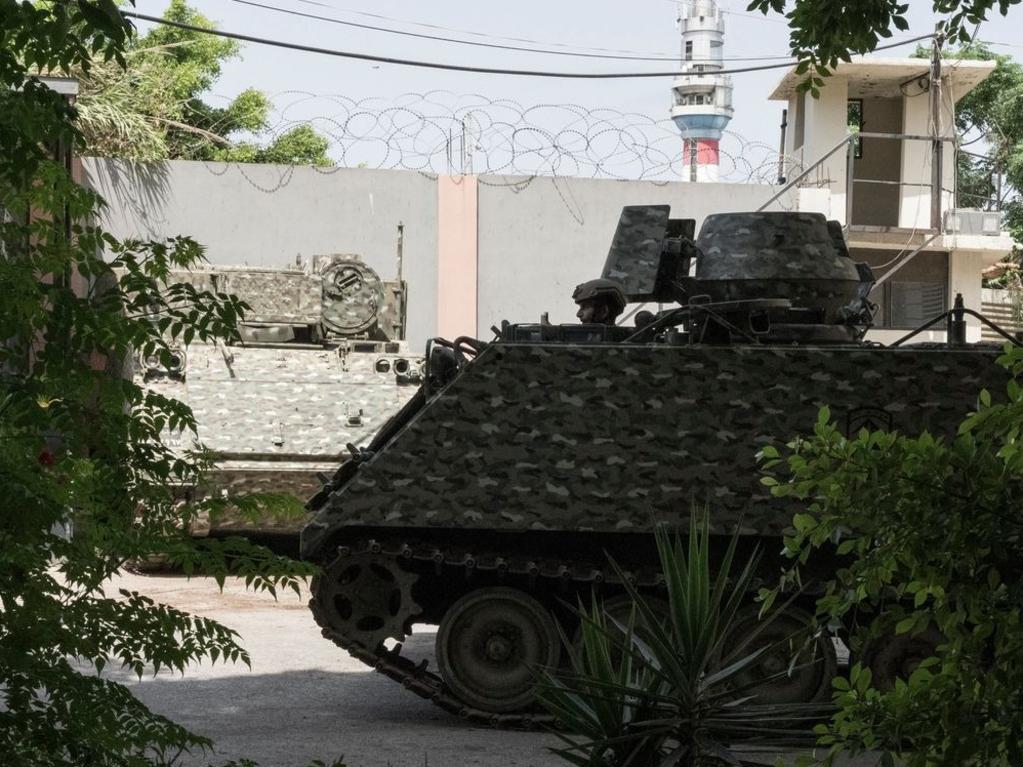Hezbollah commander Fuad Shukr killed in IDF strike on Beirut stronghold
Fuad Shukr, Hezbollah’s most senior military commander, was responsible for the Golan Heights rocket attack and had been in the sights of US forces for years.
The Israel Defence Forces have confirmed that Hezbollah commander Fuad Shukr was killed in an Israeli airstrike on the group’s stronghold in Beirut this morning (AEST).
Shukr, also known as Hass Mohsin, who was responsible for the rocket attack on the Golan Heights that killed 12 children, was killed in the “targeted” strike, Israel said.
In a statement, the IDF said Shukr was Hezbollah’s most senior military commander. He sat on the Jihad Council, Hezbollah’s top military body, and was considered to be the head of its strategic division.
The IDF said he was also a senior military advisor to the group’s leader Hassan Nasrallah, describing him as his “right-hand man.”

Since Hamas’s October 7 onslaught, Shukr has been managing Hezbollah’s attacks against Israel, including the deadly strike in Majdal Shams over the weekend that killed 12 children, the Times of Israel reports, quoting the military.
The IDF said he was “responsible for the majority of Hezbollah’s most advanced weaponry, including precise-guided missiles, cruise missiles, anti-ship missiles, long-range rockets, and UAVs” and for the terror group’s “force build-up, planning, and execution of terror attacks against the State of Israel.”
He has also been in the sights of US forces for years. In 2017, the US Treasury offered $5 million for information on Shukr, describing him as “a senior adviser” to Nasrallah and saying he had “a central role” in the deadly 1983 bombing of the US Marine Corps barracks in Beirut.

Earlier, multiple Arab and Lebanon outlets reported that Shukr was killed in the strike. Shukr, who was in charge of the organisation’s military operations in southern Lebanon, was reported dead by Lebanon’s MTV news network and UAE-based Sky News Arabia, who quoted a Lebanese security source. Saudi owned Al Hadath reported that Shukr’s body was being held at a hospital in Beirut, which is surrounded by a security cordon.
Abdallah Bou Habib, Lebanon’s foreign minister, said earlier in the week that he had received assurances from international diplomats there would be only a limited response to the rocket attack.
“Israel will escalate in a limited way and Hezbollah will respond in a limited way … These are the assurances we’ve received,” Bou Habib told local broadcaster Al-Jadeed.
The White House has so far declined to comment on the strike. “We are aware of the reports out there that the IDF just conducted a strike in Lebanon,” White House Press Secretary Katherine Jean-Pierre told reporters. “I leave it to Israel to speak for their own military operations. I do not have an immediate comment, as this just happened,” she added.
However Kamala Harris said Israel had a “right to defend itself” following the strike.
“I want to address what’s happened over the last few hours in terms of the Middle East, and be very clear Israel has a right to defend itself,” Ms Harris told reporters.
As the Israeli Defence Force struck in Beirut, a loud explosion was heard in the city’s Haret Hreik neighbourhood, according to Lebanon’s official National News Agency. The sound of sirens wailing could be heard miles away from the blast.
“The IDF (Israeli Defence Forces) carried out a targeted strike in Beirut on the commander responsible for the murder of the children in Majdal Shams and the killing of numerous additional Israeli civilians,” the military said in a statement, referring to the Druze Arab town in the annexed Golan Heights where the children were killed on Saturday.
A source close to the Iran-backed militant group confirmed that “a leading commander” was the target of the strike, which hit near the group’s decision making body, the Shura Council.
Lebanon said three civilians had died and 74 were injured in the strike.

Minutes after the explosions rocked Beirut, Israeli Defence Minister Yoav Gallant posted on social media site X that “Hezbollah crossed the red line”.
Israeli Prime Minister Benjamin Netanyahu had on Monday threatened a “severe response” to the attack which Israel and the United States have blamed on Hezbollah, though the group denies responsibility.
Following Saturday’s strike, the international community had raced to head off any escalation that might tip the two into a first all-out conflict since 2006.
Lebanon’s Foreign Minister Abdallah Bou Habib said on Monday he had received assurances from international diplomats that there would be only a limited response.
“Israel will escalate in a limited way and Hezbollah will respond in a limited way … These are the assurances we’ve received,” Bou Habib said in an interview with local broadcaster Al-Jadeed.
Analysts told AFP that they also expected Israel to temper its actions, with its leaders wary of having to fight a second war while its troops are still engaged in the Gaza Strip.
At least 531 people have been killed on the Lebanese side of the near daily cross-border exchanges, according to an AFP tally. Most have been fighters, but the toll includes at least 105 civilians.

The violence has so far killed 22 soldiers and 25 civilians on the Israeli side, including in the Golan Heights, according to army figures.
There was further deadly violence earlier on Tuesday, with Israeli medics saying a 30-year-old civilian had been killed in the northern kibbutz of HaGoshrim. The military said it had killed a Hezbollah fighter during overnight strikes.
Druze residents of the Majdal Shams – the vast majority of whom have rejected Israeli citizenship and identify as Syrians – had opposed threats of retaliation for the deadly strike.
Scores of residents had come out to protest Netanyahu’s visit after the burial of the last of the victims of the rocket strike.
A paramedic from Majdal Shams, Nabih Abu Saleh, told AFP his community was “against any Israeli response”, and asked: “Who will we strike? Our people in Syria and Lebanon?” A French diplomat told AFP earlier that Paris “alongside other partners, notably the United States, is making all-out efforts to call on the parties to exercise restraint and not to be drawn into spiralling violence”.
Multiple international airlines suspended flights to Beirut ahead of Israel’s retaliation, although the chairman of Lebanon’s Middle East Airlines, Mohammed al-Hout, said Beirut airport, its only international facility, “is not exposed to any threat, it is supposed to be a neutral place”, state media reported.
The Lebanese public, meanwhile, has been gripped by worry, with mother of two Cosette Beshara describing living “in a state of constant anxiety”.
“I’m always thinking about how I will escape with my children if war breaks out,” said the 40-year-old, adding that “life goes on in Lebanon … but always with a looming state of anxiety.”
Hezbollah has said its attacks on northern Israel are in solidarity with Hamas and the people of Gaza, who have been under siege by Israel since October 7.
The Hamas attack on southern Israel that started the war resulted in the deaths of 1,197 people, mostly civilians, according to an AFP tally based on official Israeli figures.
Militants also seized 251 hostages, 111 of whom are still held captive in Gaza, including 39 the military says are dead.
Israel’s retaliatory military campaign in Gaza has killed at least 39,400 people, according to the health ministry in the Hamas-run territory, which does not provide details on civilian and militant deaths.
Fighting has raged on unabated in the Gaza Strip, with the territory’s civil defence agency saying on Tuesday that around 300 people had been killed in the southern city of Khan Yunis during an Israeli operation there that began on July 22.
“Since the beginning of the Israeli ground invasion of the eastern part of Khan Yunis province, the civil defence and medical teams have recovered approximately 300 bodies of martyrs, many of them decomposed,” agency spokesman Mahmud Bassal told AFP.
The military meanwhile said it had completed its operation in the Khan Yunis area, which had seen heavy fighting earlier this year, and had killed “over 150 terrorists”.
AFP





To join the conversation, please log in. Don't have an account? Register
Join the conversation, you are commenting as Logout